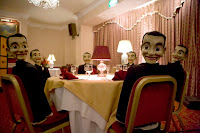The Wedding of River Song
 I have, on the whole, loved the sixth season of Doctor Who, but I've come to the conclusion that Steven Moffat has exhausted his genius. The handwriting was on the wall by the mid-season fiasco, where zany dialogue and unwieldy plot twists were supplanting character development and good storytelling. If Russell Davies (never the best writer to begin with) got worse with melodramatic cheese and go-nowhere plotting, Moffat is getting buried under the onus of his own cleverness. I hoped that for the single-episode finale he would pull out all the stops and write a brutally economical resolution to River Song, but he achieved this artificially at best. The thread launched in a fantastic season-opener, and continued in a mid-season disaster, lands results somewhere in-between, and confirm that Moffat never really had a plan with River Song.
I have, on the whole, loved the sixth season of Doctor Who, but I've come to the conclusion that Steven Moffat has exhausted his genius. The handwriting was on the wall by the mid-season fiasco, where zany dialogue and unwieldy plot twists were supplanting character development and good storytelling. If Russell Davies (never the best writer to begin with) got worse with melodramatic cheese and go-nowhere plotting, Moffat is getting buried under the onus of his own cleverness. I hoped that for the single-episode finale he would pull out all the stops and write a brutally economical resolution to River Song, but he achieved this artificially at best. The thread launched in a fantastic season-opener, and continued in a mid-season disaster, lands results somewhere in-between, and confirm that Moffat never really had a plan with River Song.Leaving aside the business of her mother's identity, River simply did not evolve into the darker character foreshadowed repeatedly since her debut in season four. The Doctor thus has not been subjected to the heartbreak of his love turning into someone who despises him, which would have been knock-down drama. In Let's Kill Hitler she went from hating and trying to kill him at the moment they meet, to saving him in the blink of an eye, inexplicably deciding that she loves this man for no reason at all. Of course, we've been promised that she really does kill him, so that couldn't be the real murder attempt, which we in fact get now: the astronaut-assassin at Lake Silencio is none other than she. But even this turns out a cheat, because she shoots him against her will, at the Doctor's command so that time can resume its course. River, in other words, wants desperately to save the Doctor, not destroy him, at the expense of everyone else in the universe locked in a moment of time. That doesn't make her dark, just astronomically selfish, and frankly unbelievable.
 At the same time, there are things to admire in The Wedding of River Song. The Doctor's determination to die is compelling, and the way all of time and history occurs at once shouts Moffat at his best. We get to see Charles Dickens interviewed on the BBC, knights on horseback sharing the London streets with automobiles, steam trains barreling out of the Gherkin and into the Pyramids, and then plenty of arial eye-candy -- balloon minis, pterodactyls, all blending together in perpetual anachronism. The Silence also help redeem the story's shortcomings, as they remain truly horrifying creatures, perched in ceilings like vampiric parasites -- the scene where the Doctor and Churchill look up to a nest of them made my heart skip a beat even knowing what was coming.
At the same time, there are things to admire in The Wedding of River Song. The Doctor's determination to die is compelling, and the way all of time and history occurs at once shouts Moffat at his best. We get to see Charles Dickens interviewed on the BBC, knights on horseback sharing the London streets with automobiles, steam trains barreling out of the Gherkin and into the Pyramids, and then plenty of arial eye-candy -- balloon minis, pterodactyls, all blending together in perpetual anachronism. The Silence also help redeem the story's shortcomings, as they remain truly horrifying creatures, perched in ceilings like vampiric parasites -- the scene where the Doctor and Churchill look up to a nest of them made my heart skip a beat even knowing what was coming.The return of Amy and Rory was a given, and trivializes Amy's departure at the end of The God Complex, though to be fair, they are different people in the alternate timeline. Rory doesn't even recognize the Doctor, and Amy is a commander in charge of keeping watch over the Silence, until they break free of their aquarium prison and unleash hell. Amy, for her part, gets in some cold-blooded murder, killing Madame Kovarian with her own eye-patch -- a wonderful moment for her character, alternate or not -- and Rory puts in some inspiring moments with his trademark loyalty and willingness to endure torment to get the right thing done.
As for the Doctor, he's in tolerable form for a sixth-season Moffat script. Unlike his opening and mid-season performances, this one isn't so hyper-manic, and his quip comes in moderation as he is weighed down by the gravitas of his imminent demise. Except of course that he doesn't die, because he's been clever in the way that only Moffat can write him:
 instead of sacrificing himself, he forces River to shoot the Teselecta disguised as him. This may be a nimble twist but is glaringly problematic. Even if the Silence are stupid enough to be fooled by sleight-of-hand, time itself is not, and we're left with the absurdity of the Doctor getting around the fixed point of his death by simply playing magician. This is where Moffat's desperate games have caught up with him. There's no denying the cleverness to the Teselecta, but cleverness, unfortunately, is all The Wedding of River Song leaves us with.
instead of sacrificing himself, he forces River to shoot the Teselecta disguised as him. This may be a nimble twist but is glaringly problematic. Even if the Silence are stupid enough to be fooled by sleight-of-hand, time itself is not, and we're left with the absurdity of the Doctor getting around the fixed point of his death by simply playing magician. This is where Moffat's desperate games have caught up with him. There's no denying the cleverness to the Teselecta, but cleverness, unfortunately, is all The Wedding of River Song leaves us with.The best part of this finale is actually Dorium Maldovar. The talking head is a perverse bit of fun who entertains me to no end, and a fitting mouthpiece for killjoy prophecies. He tells the Doctor that on the fields of Trenzalore, at the Fall of the Eleventh, a question will be asked, a question that must never be answered, which he finally bellows out in the closing scene: "Doctor WHO?", promising fundamental identity issues next season. All of the Doctor's scenes with Dorium are great, not least their exasperating trades in the TARDIS where Dorium's head is upside down. Best of all is the Doctor's end resolution: "I got too big, Dorium; I got too noisy. Time to step back into the shadows." I literally got the chills listening to Matt Smith deliver this vow. Whilst Moffat has done much to scale back the Doctor's ubiquitous savior-image from the Davies era, River Song's call for universal support was alarmingly Last of the Time Lords, and I am with the legions of fans who are applauding the Doctor's return to his classic role as an unknown traveler.
Rating: 3 stars out of 5.











